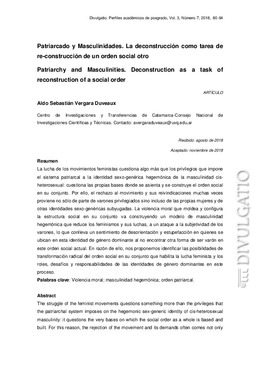Patriarcado y masculinidades. La deconstrucción como tarea de re-construcción de un orden social otro
Patriarchy and masculinities. Deconstruction as a task of reconstruction of a social order
| dc.creator | Vergara Duveaux, Aldo Sebastián | |
| dc.date.accessioned | 2021-03-01T13:59:20Z | |
| dc.date.available | 2021-03-01T13:59:20Z | |
| dc.date.issued | 2018-11-29 | |
| dc.identifier.citation | Vergara Duveaux, A. S. (2018). Patriarcado y masculinidades. La deconstrucción como tarea de re-construcción de un orden social otro. Divulgatio. Perfiles académicos de posgrado, 3(7), 80-94. | es |
| dc.identifier.issn | 2591-3530 | es |
| dc.identifier.uri | http://ridaa.unq.edu.ar/handle/20.500.11807/2799 | |
| dc.description | Fil: Vergara Duveaux, Aldo Sebastián. Centro de Investigaciones y Transferencias de Catamarca; Argentina. | es |
| dc.description.abstract | La lucha de los movimientos feministas cuestiona algo más que los privilegios que impone el sistema patriarcal a la identidad sexo-genérica hegemónica de la masculinidad cis-heterosexual: cuestiona las propias bases donde se asienta y se construye el orden social en su conjunto. Por ello, el rechazo al movimiento y sus reivindicaciones muchas veces proviene no sólo de parte de varones privilegiados sino incluso de las propias mujeres y de otras identidades sexo-genéricas subyugadas. La violencia moral que moldea y configura la estructura social en su conjunto va construyendo un modelo de masculinidad hegemónica que reduce los feminismos y sus luchas, a un ataque a la subjetividad de los varones, lo que conlleva un sentimiento de desorientación y estupefacción en quienes se ubican en esta identidad de género dominante al no encontrar otra forma de ser varón en este orden social actual. En razón de ello, nos proponemos identificar las posibilidades de transformación radical del orden social en su conjunto que habilita la lucha feminista y los roles, desafíos y responsabilidades de las identidades de género dominantes en este proceso. | es |
| dc.description.abstract | The struggle of the feminist movements questions something more than the privileges that the patriarchal system imposes on the hegemonic sex-generic identity of cis-heterosexual masculinity: it questions the very bases on which the social order as a whole is based and built. For this reason, the rejection of the movement and its demands often comes not only from privileged men but also from women themselves and from other subjugated gender-generic identities. The moral violence that shapes the social structure as a whole is building a hegemonic model of masculinity that reduces feminisms and their struggles, to an attack on the subjectivity of men, which entails a feeling of disorientation and stupefaction in those who are located in this dominant gender identity when not finding another way of being male in this current social order. Because of this, we propose to identify the possibilities of radical transformation of the social order as a whole that enables the feminist struggle and the roles, challenges and responsibilities of the dominant gender identities in this process. | en |
| dc.format | application/pdf | es |
| dc.language | spa | es |
| dc.publisher | Secretaría de Posgrado. Universidad Nacional de Quilmes | es |
| dc.rights | https://creativecommons.org/licenses/by-nc-nd/2.5/ar/ | es |
| dc.source | Divulgatio | es |
| dc.subject | Hombres y masculinidades | es |
| dc.subject | Violencia | es |
| dc.subject | Moral | es |
| dc.subject | Patriarcado | es |
| dc.subject | Cambio social | es |
| dc.subject | Men and masculinities | en |
| dc.subject | Violence | en |
| dc.subject | Patriarchy | en |
| dc.subject | Social change | en |
| dc.subject | Homens e masculinidades | pt |
| dc.subject | Violência | pt |
| dc.subject | Mudança social | pt |
| dc.title | Patriarcado y masculinidades. La deconstrucción como tarea de re-construcción de un orden social otro | es |
| dc.title | Patriarchy and masculinities. Deconstruction as a task of reconstruction of a social order | en |
| dc.type | info:ar-repo/semantics/artículo | es |
| unq.articulos.paginicio | 80 | es |
| unq.articulos.pagfinal | 94 | es |
| unq.revista.numero | 7 | es |
| unq.revista.volumen | 3 | es |
| unq.version | info:eu-repo/semantics/publishedVersion | en |
| unq.articulos.seccion | Artículos | es |
| unq.tipo.snrd | info:eu-repo/semantics/article | en |
| unq.acceso | info:eu-repo/semantics/openAccess | en |
Files in this item
This item appears in the following Collection(s)
-
Vol. 03, no. 07
Publicada en el año 2018.

